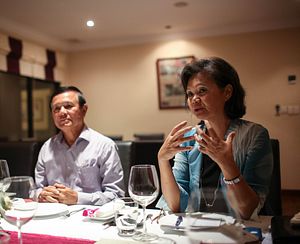Cambodian activists continued to wear black on Monday after a local court denied bail for detained human rights defenders.
What’s behind this so-called “Black Monday” campaign? It began last month when four officers of the human rights group ADHOC and an election official were arrested by the police for allegedly bribing a young woman to remain silent in relation to a sex scandal case involving Kem Sokha, the country’s second most prominent opposition leader. ADHOC insists the group was merely extending legal aid to the woman as part of its advocacy work.
To press for the release of these persons, various groups launched a campaign urging the public to wear a black t-shirt every Monday as a sign of protest against the repressive policies of the state.
Every Monday since May 9, activists have been trying to assemble in Phnom Penh but these actions were all quickly dispersed by the police for failing to secure a permit from the authorities. The government even branded the “Black Monday” campaign as an urban rebellion and a foreign-instigated political action. The government also produced a promotional video warning citizens about the dangers of using “excessive” civil rights that could lead to a “color revolution” and destabilize society. The video showed how people’s uprisings transformed Libya and Syria from being progressive countries into failed states.
Chak Sopheap, the executive director of the Cambodian Center for Human Rights, is worried that the goal of the video is “clearly to intimidate ordinary people from the full and peaceful exercise of their human rights, and represents a serious misrepresentation of both domestic and international human rights law.”
Perhaps sensing the increasing online support for the “Black Monday” campaign, the ruling party threatened to arrest individuals participating in “illegal” protest actions. The “Free Human Rights Defenders” campaigners were also told to secure approval from authorities before posting criticisms on Facebook and other social media sites.
Responding to the harsh measures implemented by the government, around 83 civil society groups signed a statement condemning the criminalization of dissent.
“The government’s fear of people wearing colors is ludicrous. Authorities targeted us just for wearing a black T-shirt, which is a peaceful expression of dissent,” an excerpt from the coalition’s statement read.
The detention of activists is not the only troubling indicator of deteriorating democracy in Cambodia. Opposition politicians have been charged with old and new criminal cases, which could lead to their expulsion from the Parliament. Opposition leader Sam Rainsy went into exile again after the government revived an old defamation case against him.
Two weeks ago, the government decided to press charges against Kem Sokha, even if the latter enjoys parliamentary immunity.
On May 31, the spokesman of the United Nations secretary general expressed concern about the political situation in Cambodia. According to a spokesperson, Ban Ki-moon is concerned about the escalating tensions between the ruling and the opposition parties in Cambodia, particularly the arrests or attempted arrests of parliamentarians, who enjoy parliamentary immunity. “A non‑threatening environment of democratic dialogue is essential for political stability and a peaceful and prosperous society,” the spokesperson said.
A stronger statement was released by UN human rights experts against the systematic campaign of Cambodia’s ruling party to harass the opposition and members of the civil society. They described the case against the detained human rights defenders as a “politically-motivated persecution of civil society.”
After the opposition decided to end their boycott campaign and assume their duties in Parliament in 2014, there were expectations that it would lead to a national reconciliation and strengthen the “culture of dialogue” among the country’s leaders. But the dialogue was brief and insubstantial, which only exacerbated the political crisis.
Cambodia’s ruling party, which has been in power for three decades already, is claiming that what exists in the country is a so-called pluralist democracy. But the continuing “Black Monday” campaign is a potent reminder that human rights, justice, and democracy are still under attack in the country.

































